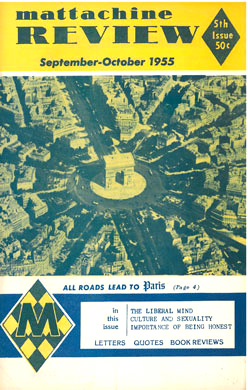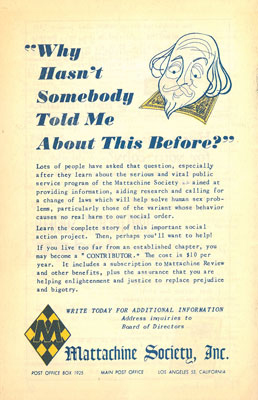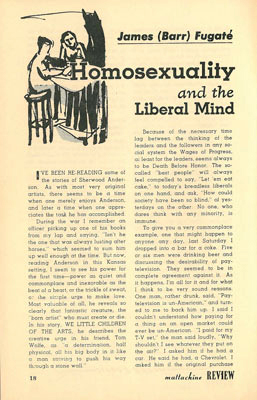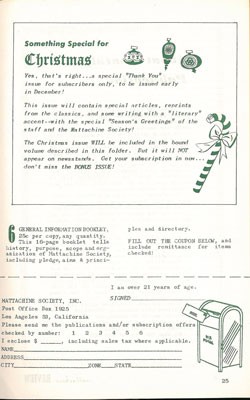1955: a different world than today in so many respects. Eisenhower was president, the Cold War and the threat of communism and nuclear war hung heavy over the hearts and minds of Americans, and despite the tight sweaters, push up bras, beefcakes on the beach, and the new rock 'n roll music, sex was a dirty secret performed in a bedroom by a mommy and daddy who each slept on twin beds (that is, on television!). Homosexuality, in fact, any kind of sexual diversity, was taboo. Not only taboo, but illegal.
Thus, in 1955, Mattachine Review, published by The Mattachine Society, was the only gay rights, or “homophile,” magazine in the country. In those days there existed physique magazines like Bob Mizer's Physique Pictorial, but these homoerotic publications had to “cover” as bodybuilding manuals to avoid censorship by the United States Post Office.

The Mattachine Society, founded in 1950 by Harry Hay and a group of friends in Los Angeles, was one of the earliest gay rights groups in the United States.
The primary goals of the society were, according to the group's mission statement found in many of the group's publications:
“1. Unify homosexuals isolated from their own kind;
2. Educate homosexuals and heterosexuals toward an ethical homosexual culture paralleling the cultures of the Negro, Mexican and Jewish peoples;
3. Lead the more socially conscious homosexual to provide leadership to the whole mass of social variants; and
4. Assist gays who are victimized daily as a result of oppression.”
This was the era of McCarthyism and, as it turned out, most of the founders of Mattachine were affiliated with Communism. As the McCarthy persecution of Communists progressed, the association of Mattachine founders with Communism concerned some of its members as well as supporters. Hay, a member of the Communist Party for 15 years, stepped down as the society's leader. The new leadership structure became influenced less by Communism and more by a liberal ideology similar to that espoused that by the African-American civil rights organizations.

What does the word Mattachine mean? According to Jonathan Katz in his book Gay American History, Harry Hay claimed:
“One masque group was known as the 'Société Mattachine.' These societies, lifelong secret fraternities of unmarried townsmen who never performed in public unmasked, were dedicated to going out into the countryside and conducting dances and rituals during the Feast of Fools, at the Vernal Equinox. Sometimes these dance rituals, or masques, were peasant protests against oppression—with the maskers, in the people’s name, receiving the brunt of a given lord’s vicious retaliation. So we took the name Mattachine because we felt that we 1950s Gays were also a masked people, unknown and anonymous, who might become engaged in morale building and helping ourselves and others, through struggle, to move toward total redress and change.”
A brief perusal of some of the articles in the September/October 1955 issue shows not only how attitudes about homosexuality have changed drastically today, but also how some of the issues are still relevant today as the “culture wars” continue to erupt over the legalization of same-sex marriage.
The newsletter features articles entitled “The Liberal Mind,” “Culture and Sexuality,” and “The Importance of Being Honest.” The last article emphasizes the importance of historic research on homosexuality and claims, though somewhat gently, that one should not make the assumption that homosexuality has always been a dangerous perversion and threat to society. Gays are still fighting this assumption, much more overtly of course today than in 1955.

There is also a short article on Havelock Ellis and his views on homosexuality. Havelock Ellis, a British doctor and psychologist, coauthored the first medical textbook on homosexuality in 1897. He also studied what today are called transgender phenomena. Together with Magnus Hirschfeld, Ellis is considered a major figure in the history of sexology to establish a new category that was separate and distinct from homosexuality.
Albert Ellis contributes a piece entitled “The Influence of Heterosexual Culture on Homosexual Attitudes,” significantly, romance and marriage. Yet nowadays, one could make a case for the opposite in a culture which produced Queer Eye for the Straight Guy!
James Phelan contributes an article on the treatment of sex offenders: gays are lumped together with child molesters and rapists as “sexual psychopaths,” all of whom need rehabilitation through an experimental group that uses the Alcoholics Anonymous model, called ESP, Sex Psychopaths Anonymous. Today, many right wing extremists, such as the husband of Michelle Bachman, would still concur with this notion, but incorporate it into the therapeutic model “praying away the gay.”
What is also interesting is a response to someone asking to be taken off the magazine's mailing list. The response from the editors is that The Mattachine Society is “NOT an organization of homosexuals, but of people interested in human sex problems, especially those of the homosexual and sex variant.” Such was the danger of being raided and arrested and censored and thrown in prison as a “sexual psychopath” that the editors felt it necessary to hammer home this point (and others points about the Society not being secret) in what was a real climate of fear in the 1950s.
Yet a selection from a book entitled Sex and the Law by a Judge Ploscowe printed in this issue does indicate the seeds of a shift in attitudes, calling for a repeal of heterosexual anti-sodomy statutes, which would also hinge on decriminalizing private homosexual conduct. Stay in the closet, ye homosexuals, the author seems to be saying, for what you are doing sexually is fine privately, not publicly, because it accords with your essential nature. One can't totally repress “unconventional” sexual behavior, either homosexual or heterosexual. The law (arrests, imprisonment) cannot change “scandalous,” that is publicly deviant, homosexual behavior but psychiatry and science can change behavior. Still, there seems to be the assumption that homosexuals can and should change for the good of society. But the author also decries heterosexual sexual crimes (again, lumping together homosexuality with criminal acts as noted in the Albert Ellis article described above), including child molestation and male prostitution. Thus, perhaps, the homosexuals shouldn't take all the blame for deviances from the heterosexual norm.
Now, as the United States nears the end of 2014, some LGBT people are fearful, not because of who they are and certainly not because of the enormous strides in the legalization of same-sex marriage, but because many politicians and religious leaders on the far right seek to return to the fearful isolationism and xenophobia of the 1950s. Harry Hay and the members of the Mattachine Society showed remarkable courage in beginning the fight against gay invisibility; now that gays are so powerful and visible, we are perhaps even more vulnerable. Since those days in the 1950s, LBGT people have dropped their masks; now their only protection is the truth of their stature as loving, just persons.
If you like our blogs, please reblog or retweet or email them on to a friend.
Also, please support Bijou during this holiday season by going to our website and purchasing an item or two of vintage gay sexuality for yourself or as a unique gift for a friend.




 Join our Email List
Join our Email List Like Us on Facebook
Like Us on Facebook Instagram
Instagram Youtube
Youtube Follow Us on Twitter
Follow Us on Twitter Follow us on Pinterest
Follow us on Pinterest